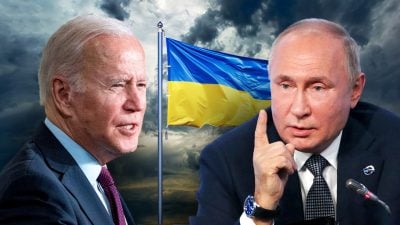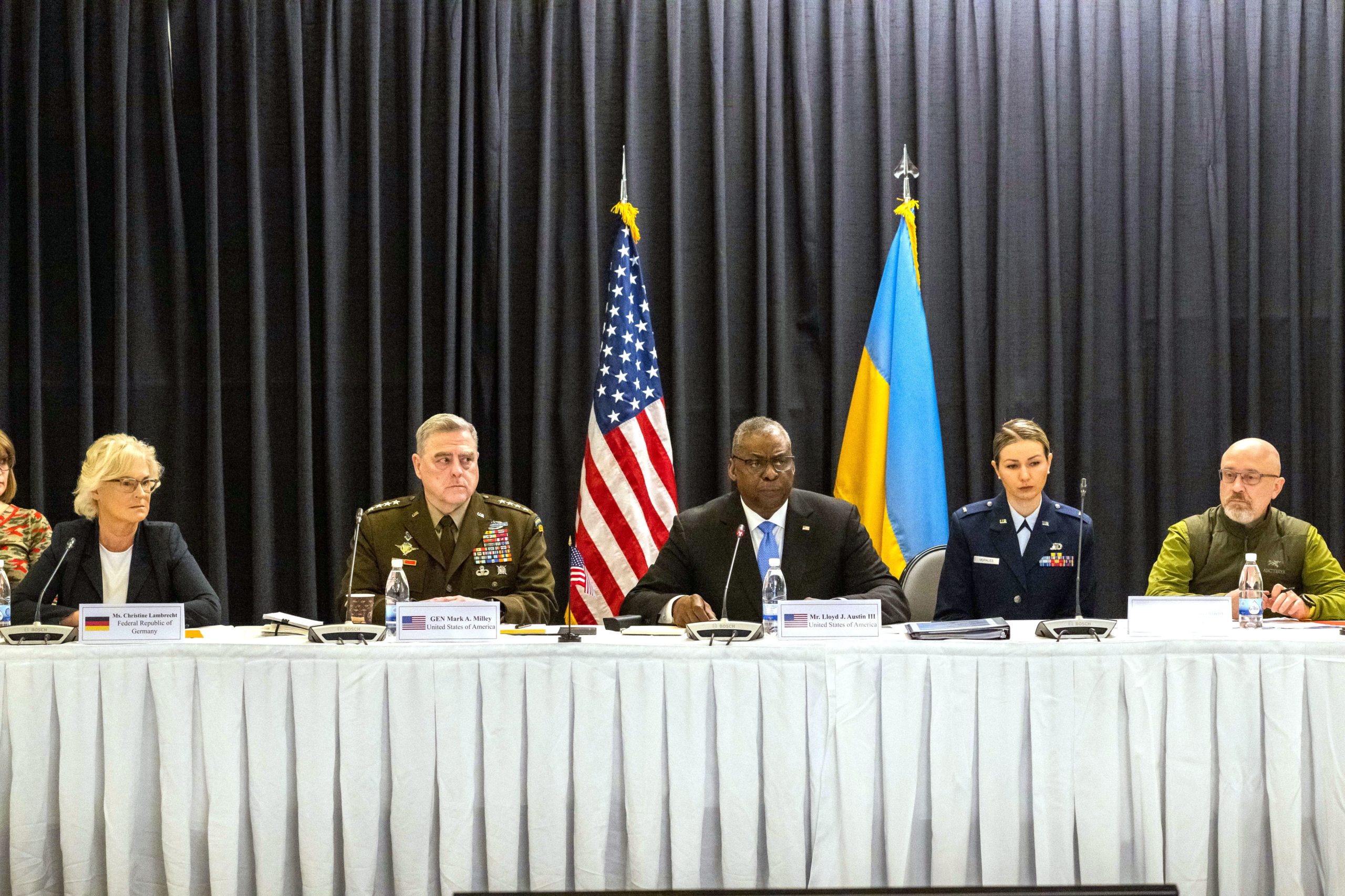Dangerous Crossroads: Putin Warns the US to Back Off in Ukraine

The Western narrative of the two-month old war in Ukraine imbued with the rhetoric of “democracy versus autocracy,” has dramatically changed with the assertion by the US Secretary of Defence Lloyd Austin at a news conference in Poland Monday following his and Secretary of State Antony Blinken’s trip to Kiev, that Washington wants to “to see Russia weakened.”
David Sanger at the New York Times noted that Austin was “acknowledging a transformation of the conflict, from a battle over control of Ukraine to one that pits Washington more directly against Moscow.” But this is not really a transformation. Sanger’s colleague at the Washington Post, David Ignatius, had written over three months ago that the Biden Administration was working on a road map to get Russia blogged down in Ukraine and attrition it in a way that it becomes a much diminished power on the world stage.
 US Def. Secy. Lloyd Austin (3rd from right) chairing Ukraine Security Consultative Group meeting, Germany, April 26, 2022
US Def. Secy. Lloyd Austin (3rd from right) chairing Ukraine Security Consultative Group meeting, Germany, April 26, 2022
For the Kremlin, most certainly, Austin’s remark would not have come as surprise. As recently as on Monday, President Vladimir Putin repeated at a meeting in the Kremlin that the US and its allies have sought to “split Russian society and destroy Russia from within.” Putin revisited the topic again on Wednesday pointing out that “the forces that have been historically pursuing a policy aimed at containing Russia just don’t need such an independent and large country, even enormously large, in their view. They believe that its very existence poses a threat to them.”
In fact, several perceptive Western observers had estimated that the Kremlin has effectively fallen into a trap laid by the US that is intended to bring down Putin’s regime. Come to think of it, that famous gaffe on 26 March wasn’t a gaffe after all, when President Biden, speaking in Warsaw, had blurted out the impromptu, unscripted remark: “For God’s sake, this man (Putin) cannot remain in power.”
All the same, Austin’s remark signifies that a dramatic change is taking place in the geopolitical situation, which could have positive or negative results. On Monday, Russian Foreign Minister Sergey Lavrov warned the West that staying involved in the Russia-Ukraine war posed “serious” and “real” risks of a World War III and “we must not underestimate it.”
To be sure, the conflict is slowly but steadily turning into a new phase. Foreign fighters and soldiers from NATO regular units are increasingly beefing up the depleted Ukrainian army’s front lines.
That said, the optics also need to be understood. Austin’s war cry comes soon after Mariupol fell to the Russian forces. A couple of thousands Ukrainian nationalists and a few hundred military personnel from NATO countries are trapped in an underground labyrinth at the Azovstal complex in the city, which Russian forces have sealed off. It has been a severe blow to the US’ prestige.
The Russian special operation is on track — “grinding” the Ukrainian forces to the ground, to borrow the graphic expression from UK prime minister Boris Johnson. On Monday, Russian high-precision missiles hit at least six railway substations in Western Ukraine destroying railway facilities in Krasnoe, Zdolbunov, Zhmerinka, Berdichev, Kovel, Korosten, which were meant to be key transshipment points for the supply of Western weaponry to the Ukrainian forces in the Donbas region. Rail communication in several western regions of Ukraine is effectively blocked.
Reports from the east show that Ukrainian forces are suffering heavy losses. Russian forces have taken the city of Kremennaya and are approaching the town of Lyman, which would give them control of a direct road to Slavyansk from the east.
Austin’s hyped up rhetoric notwithstanding, Ukraine is not only not showing any signs of winning but keeps bleeding, and the territory under the actual control of the Ukrainian government is steadily shrinking. The US officials admit that Pentagon lacks the ability to track the weapons that are going in. Yet, the Biden administration has so far spent around $4 billion on Ukraine. Therein hangs a tale. Who are the real beneficiaries of the US supplies? The level of corruption in Ukraine is a legion.
The plain truth is that it will be many weeks or months before meaningful volumes of heavy weapons could be delivered to Ukrainian combat units but in the meanwhile, the Battle of Donbass will be fought almost entirely on the basis of the current strength on the ground. In a detailed analysis this week, a former colonel in the US Army and prolific media commentator Daniel Davis concluded: “It will take too long for Western governments to come up with a coherent equipping plan and then prepare, ship, and deliver the kit to its destination in a timeframe that could provide Kyiv’s troops the ability to tip the balance against Russia.”
The bottom line is this: The Biden Administration’s geopolitical agenda is to prolong the military conflict, which apart from weakening Russia militarily and diplomatically, turns Europe into a battlefield and makes the continent heavily dependent on the US leadership for a very long time to come. For Biden, the war provides a useful distraction in US politics in an election year.
Austin hosted a conference of the US’ allies on Monday at the American base in Germany to form a monthly contact group on Ukraine’s self defence to coordinate the “efforts to strengthen Ukraine’s military for the long haul.” It has the ominous look of a “coalition of the willing.” Even Israel was recruited. But the US is underestimating the steely Russian resolve to fully realise the objectives behind the special operation in Ukraine. Moscow will not brook any roadblocks, no matter what it takes.
Putin issued a stern warning today:
“If someone from outside moves to interfere in the current developments, they should know that they will indeed create strategic threats to Russia, which are unacceptable to us, and they should know that our response to encounter assaults will be instant, it will be quick.”
He was explicit that Russia has military capabilities that the US cannot match.
“We have all the tools to do it, the tools that others can’t boast of at the moment, but as for us, we won’t be boasting. We will use them if the need arises and I would like everyone to be aware of it. We have made all the necessary decisions in this regard,” Putin warned.

